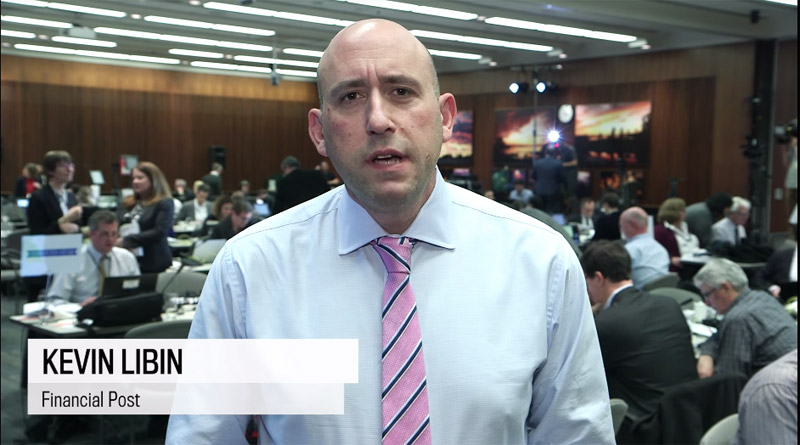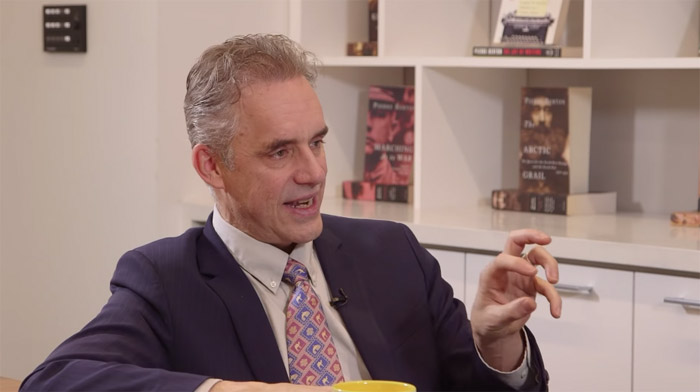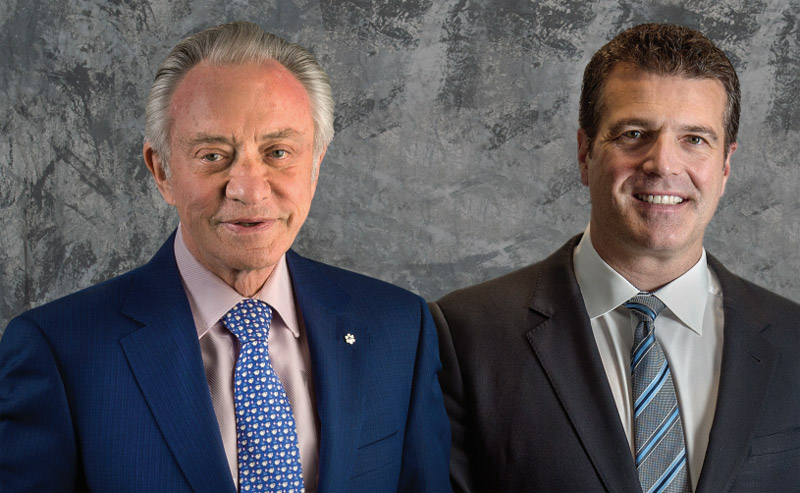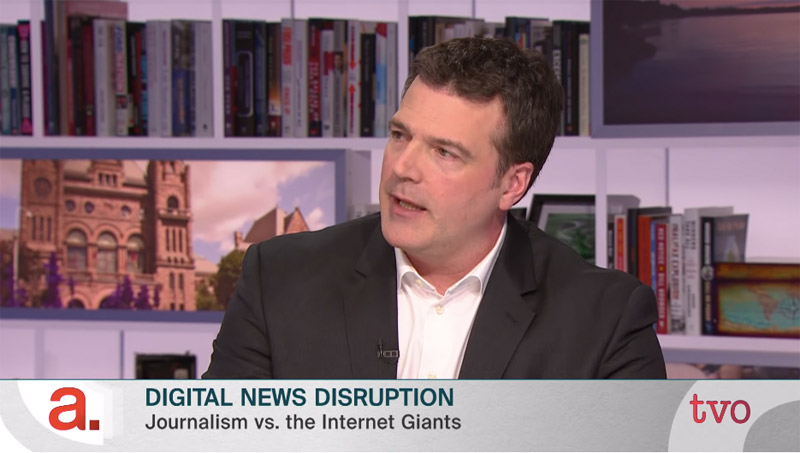
New CEO Andrew MacLeod has a plan to muffle moderate voices at Canada's largest newspaper company. It's created confusion and uncertainty in newsrooms across the country.
It was not out of the ordinary at Postmedia, Canada’s largest newspaper chain, for editors to have their knuckles rapped for failing to meet the political expectations of the company’s conservative management.
In 2015, after the federal election that brought Justin Trudeau’s Liberals to power, Andrew Potter, then editor-in-chief of the Ottawa Citizen, was called to the company’s head offices in Toronto.
There, Lou Clancy — then Postmedia’s senior vice president of content — told Potter that his paper was too “anti-conservative,” according to three sources. When Potter asked for specific examples of coverage that could be improved upon, Clancy could only cite a single editorial cartoon.
Nor was it out of the ordinary for management to use its papers to make election endorsements without the input of editors.
During the 2015 federal election, for example, the Citizen was ordered by Postmedia bosses to endorse the Conservative Party of Canada. This despite its reporting in the years before having led to three Conservatives being put on trial; two of them ultimately went to jail. Still, the paper argued, the party remained the best choice for Canadians. (A month after the election, the members of the Citizen’s editorial board resigned).
In the 2015 Alberta election, the Edmonton Journal — another of the chain’s metropolitan daily broadsheets — was ordered to endorse Alberta’s Progressive Conservatives, after the paper had unearthed a run of embarrassing stories for the ruling party, and in a campaign where it was universally held that the PCs had underperformed.
At Postmedia, this was all par for the course.
But October 2018 was different. October 2018 was the start of something unprecedented.
Several editors at the National Post — Postmedia’s flagship newspaper with an explicitly conservative political mandate, where I reported on media from 2016 to 2017 — were summoned to a meeting on the 12th floor of the company’s headquarters.
There, according to three sources familiar with the meeting, company president Andrew MacLeod told them that their paper — which launched in 1998 to serve as the voice of thoughtful, modern Canadian conservatism, and which many would argue remains so — was insufficiently conservative.
Some of the Post’s marquee columnists, albeit right-leaning, have tended to take a variety of positions on subjects ranging from carbon pricing to socio-cultural issues, and so editors were told the paper had to become more reliable in its conservative politics.
“But really!?” one editorial employee remembers thinking when they were briefed on the meeting. “The National Post not conservative enough?!”

Postmedia has declined to comment on most of the details in this story. Phyllise Gelfand, the company’s vice president of communications, said she would not address “rumours you may have heard” or “details of internal meetings that did or did not happen and what was said or not said.”
What has happened, according to interviews with over 30 current employees and more than a dozen former employees — ranging from reporters to editors to corporate staff — is that Postmedia has given a directive for all of its papers to shift to the political right, in an unprecedented, centralized fashion. Many said that the changes have thus far been poorly executed and communicated inside the company, resulting in a cloud of uncertainty and confusion among reporters and editors across the chain.
Not one staffer would speak on the record, almost universally due to fear of reprisal from management. “Write that in your story,” said a former senior employee. “That says it all, everyone is afraid to talk.”
The October 2018 meeting may have been a harbinger, but the first full-blown change actually happened earlier this year.
In June, MacLeod — who assumed the role of CEO in January and did not respond to requests for an interview — tapped veteran National Post journalist and commentator Kevin Libin, considered by some at the chain to be among its most conservative editorial voices, to oversee federal and provincial political reporting and certain commentary published across Postmedia’s newspapers.
His mandate is straightforward: to make the papers more “reliably” conservative. Fifteen current employees confirmed this was their understanding of his new role, and that it had been communicated to them by management or a superior.
One prominent writer expressed concerns that Libin’s views on climate change could pose a threat to objective coverage of issues such as carbon pricing across the chain
“This appointment means that Postmedia is placing greater emphasis on political coverage in general and Kevin will work with all of our newsrooms on our political coverage,” said Gelfand.
One perspective is that the strategy is simply a business decision: MacLeod has put forward what some said is a practical vision of reasserting the mandate of the National Post, which was founded to be a conservative alternative to Ottawa’s federal Liberal establishment.
It is planned that the rest of the chain’s broadsheets will follow suit, adopting a more consistent conservative outlook and a punchier political voice under Libin’s guidance. (He declined to comment for this story.)
“The National Post was founded as a unique small-C conservative voice, filling a gap in the Canadian media landscape,” Gelfand said. “Our strategy involves delivering high-quality journalism to audiences who are looking for it.”
The hope, sources said, is that Postmedia can firmly assert itself as a publisher of prestige conservative news brands, bringing the company in line with the likes of The Wall Street Journal and London’s Daily Telegraph.
“Postmedia sees its market niche as being the only mainstream conservative media outlet in the country, and I think the feeling is some papers don’t have many conservative voices anymore,” said one current editorial employee.
But the chain-wide consolidation of political coverage required for this gambit is unprecedented.
Jordan Peterson has been working on a secret project out of the fifth floor of Postmedia’s offices
Many employees fear current plans to double down on what management calls “reliable conservative voices” will eradicate the local perspectives and political independence of some of Canada’s oldest and most important newspapers. These include the Citizen, Journal, Montreal Gazette, Vancouver Sun, Windsor Star, Saskatoon StarPhoenix, and Calgary Herald. In some large Canadian cities, Postmedia runs the only local daily newspaper (or in the case of Montreal, the only English-language daily).
Justification for such concerns has already emerged, according to several sources.
Since Libin’s appointment was announced, one editor-in-chief was removed from his newspaper and reassigned to a newly created corporate role, after he raised objections that the company was not respecting the editorial independence of his newsroom and after he published an editorial board endorsement of carbon pricing, which upset management.
Responsibility for the National Post’s political bureau in Ottawa was taken away from the paper’s head of news, who also had to be informed by one of his own writers that he was no longer in charge of them.
Meanwhile, reporters and editors across the chain are perplexed by the seemingly opaque nature of Libin’s powers, which has left them uncertain about what kinds of stories they will or won’t control going forward.
And in a separate development stemming from Postmedia’s interest in shoring up a conservative audience base, Jordan Peterson — the prominent psychologist and University of Toronto professor who has become a global celebrity for his critiques of left-wing politics — has been working on a secret project out of the fifth floor of Postmedia’s offices.
The announcement came on June 10. In a memo to Postmedia editorial staff, Lucinda Chodan, Postmedia’s senior vice president of content, said that Calgary-based Kevin Libin, editor of the National Post and Financial Post comment pages, was being promoted to a new role with the title “executive editor of Postmedia politics.”
“His new mandate will be to bring his skills and talent to fostering Postmedia’s clear and distinctive voice in the Canadian political landscape,” wrote Chodan.
The company settled on the position, sources said, after it initially floated the idea of having Libin oversee coverage of the 2019 Alberta election. Discussions to that end involved MacLeod and Libin in early 2019, and were the first indication to some that Postmedia’s new CEO had taken a detailed interest in the political coverage of his publications.

When Mark Iype, then editor-in-chief of the Edmonton Journal and Edmonton Sun, got word of the proposal to have Libin run coverage that overlapped with the responsibilities of individual newsrooms, multiple sources said, he strongly objected and made his views known.
But then-Alberta Premier Rachel Notley called an election in mid-March, earlier than some had predicted, and so discussions to put Libin in charge of Alberta coverage weren’t seen through.
Iype continued to run his newspapers in the leadup to the April 16 vote, won by Jason Kenney’s United Conservative Party (UCP), which Postmedia papers were ordered to endorse. (The Journal’s UCP endorsement, unlike its usual editorial board pieces, did not bear the name of the editorial board members.)
After the election, on May 24, the Journal’s editorial board — of which Iype was a member — endorsed the carbon tax brought in under Notley’s previous NDP government, something which Kenney had vociferously campaigned against.
https://twitter.com/MichelletypoQ/status/1132789744520159232
Postmedia corporate immediately raised the piece as an issue with Iype, arguing it strayed too far from the company’s vision for its editorial content, five sources familiar with the discussions said.
A week earlier, it was revealed that Postmedia had hired a lobbyist — Kenney’s former chief of staff and campaign director, Nick Koolsbergen — to see if the company could produce content for a planned $30 million government “war room” to fight what Kenney alleges are false narratives circulating in the media and among activists about Alberta’s energy and oil sector.
Former Journal columnist Paula Simons, now an independent senator for Alberta, told the CBC the lobbyist hiring would compromise the editorial credibility of the company’s papers in the province.
But with the province’s election out of the way — and a federal election coming up this fall — it was decided that rather than have Libin run political coverage for just Alberta, he would take the helm of all political coverage across the chain.
Iype — who had objected to Libin’s earlier proposed role and whose editorial board had come into direct conflict with the government Postmedia was wooing — was removed from his position at the Journal and reassigned to a newly created role.
Two sources at Postmedia’s corporate headquarters in Toronto, familiar with management’s thinking, confirmed that the company was displeased with the political orientation of the paper under his watch, and did not see him as suited to managing a conservative shift.
(In an unrelated move, the Journal also lost its deputy managing editor, Sarah O’Donnell, last week — she resigned to take another job.)
The way Iype’s reassignment was carried out, sources said, is a testament to how poorly organized, and sometimes seemingly improvised, the changes at Postmedia around Libin’s promotion have been.
On June 12, the shared newsroom of the Edmonton Journal and Sun was visited by Lorne Motley, Postmedia’s vice president of editorial for the western region.
Motley, in a reflection of deep cuts and consolidation at the heavily indebted company, is also the editor-in-chief of the Calgary Herald and Calgary Sun.
According to seven sources at Postmedia’s Edmonton offices, he informed employees that Iype had been moved to a “special projects” role; the paper’s managing editors then began reporting to Motley on an interim basis.
The visit struck several who were there as unusual. Normally, significant personnel changes would be announced via memo, as had happened with Libin two days before. But this one was communicated only verbally. Staff moved on with their jobs, but remained quiet out of respect for Iype, whose circumstances remained a mystery.
Meanwhile, Iype’s name was removed from the contact page of the newspaper’s site sometime on June 14 or 15. He removed his title from his personal Twitter bio around the same time, and by June 19 was no longer listed as a member of the Journal’s editorial board.
His name, however, was kept on the print mastheads of the Journal and Sun.
Contacted on July 8, Gelfand, Postmedia’s spokesperson, insisted via email that Iype was still the editor of the newspapers, attaching a pdf of the Journal print masthead that still bore his name. “With respect to special projects people work on, we wouldn’t comment on that publicly,” she added.

The seven sources at Postmedia’s Edmonton office said this was untrue, and that Iype had stopped working in the newsroom after Motley’s announcement.
I reached out to Gelfand a week later, on the morning of July 16, with a detailed account of the June 12 meeting. A few hours later, Postmedia sent a memo to the Edmonton newsroom announcing what they had already told staff a month earlier: that Iype was no longer editor of the Journal and Sun. Now, he had accepted a new position as “editor in chief, special projects.”
“The new role will see Mark continue in the work he has been doing on a temporary basis, including national coordination of newsprint consumption, cross-functional team projects, and marketing liaison,” wrote Chodan, in a memo addressed to the Edmonton newsroom. A search for a new Journal and Sun editor-in-chief was to commence immediately. (A job listing was posted this past week).
“Mark Iype has accepted a new national role and that was announced today,” Gelfand wrote, in a July 16 email (emphasis in original). She declined to comment on the June 12 announcement to the newsroom.
Asked multiple times between July 8 and 16, Iype himself declined requests for comment. Allegedly still the editor of two daily newspapers, he could not even answer the question of what his job was.
Holy McJesus! Just what in the hell is going on at @edmontonjournal? They printed this? In 2019? Add a yellow star and it would be straight out of Nazi Germany. After the Tim Mikula-debacle I was starting think the office was unmanned. Now I’m convinced. https://t.co/nOeOExJcK7
— Omar Mouallem (@OmarMouallem) August 9, 2019
His removal was a shock to many. Iype was a steward of hope after devastating cuts in 2016. He was well-liked by staff, and responsible for rebuilding the Journal and Sun newsroom — which won several National Newspaper Awards under his leadership — after Postmedia dismissed editor-in-chief Margo Goodhand and 34 other employees in January 2016, merging the two papers’ operations into one.
“Mark Iype took the helm of the Edmonton Journal and Edmonton Sun when the two papers were reeling from layoffs and from the aftershocks of their merger,” Simons said, in a message. “He brought two very different newsrooms together and united them as one team. He restored morale, pushed for excellence, and backed his journalists to the hilt. As a columnist, I often wrote about controversial, difficult topics. I always felt that I had his support.”
Asked about the current situation in their workplace, one Postmedia employee in Edmonton replied, “¯\_(ツ)_/¯.”
Libin — a longtime National Post employee — has held several senior positions at the paper, including stints as managing editor and as editor of its business section, the Financial Post.
As a columnist, he has taken a hard line on climate issues in particular, cheering on U.S. President Donald Trump’s withdrawal from the Paris Agreement and mocking the idea that carbon dioxide (which, Libin notes, is “produced by so many living organisms”) should be considered pollution. He has written that the “climate panic” is a kind of “big business” that could be harbouring “vested interests” among its “great slush of shekels.” As comment editor, he has given platforms to climate-change deniers (“skeptics”).
He criticized the Canadian government’s early-2017 decision to pull ads from Breitbart, writing of the far-right outlet that “it certainly is inflammatory, often tacky, extremely alt-right, and flamboyantly politically incorrect, so it’s understandable that some in politics would think it needs correcting.” Around the same time, he warned that “established news companies like The New York Times, CNN, BBC, and CBC will lobby fiercely to ensure [Facebook’s] fake-free news algorithms favour their creaking liberal-legacy media empires over others that might even be more popular, like Breitbart or The Rebel.”

Libin, however, is also informed by his extensive experience as a straight-news editor, having, by many accounts, performed capably in such senior roles at the Post.
In addition to his newspaper background, Libin was a founding editor of Ezra Levant’s Western Standard in the 2000s, and worked for that publication in its nascent days, when it was a provocative news-and-views conservative-libertarian magazine that played a leading role in western political circles. It could be argued that this experience makes him particularly suited to the current task he has been given, which is to reinvigorate Postmedia’s voice and energize its presence on the conservative circuit.
(I worked with Libin when we were both employed by the Financial Post in 2016 and 2017, where I was a reporter and he was comment editor. I found him to be an especially kind, friendly, and helpful senior manager, who in several cases offered sound advice or feedback on stories, which included offering his own knowledge and sources.)
On July 17, Chodan met with Postmedia’s Parliament Hill bureau in Ottawa and assured reporters that, while Libin indeed has a mandate to strengthen the conservative voice of the chain’s newspapers, the mission is akin to that of The Economist or The Wall Street Journal — possessing stated political values but reporting in accordance with rigorous journalistic principles.
This managed to ease the concerns of some.
One current employee said it’s not yet clear to what degree Libin might intervene in editorial decision-making but suspects he’ll primarily focus on opinion and commentary pieces. They point out that every newspaper has its own internal B.S. and theirs may involve fielding occasional half-baked story ideas from management.
“Do I have to pick up the phone and call him if Pamela Anderson goes on another political tirade?”
However, two federal government sources and one Postmedia employee said that one prominent writer for the newspaper chain expressed concerns to them in private conversations that Libin’s views on climate change could pose a threat to any attempts to objectively cover issues such as carbon pricing, and that the company gave a vague non-answer when the writer asked what would happen to stories that feature favourable views of carbon taxes.
A week earlier, Ottawa columnist John Ivison had written a piece attacking the climate plan of Conservative leader Andrew Scheer. Multiple people said they worry there will be fewer articles like that going forward.
Meanwhile, the Ottawa bureau has ceased reporting to Jordan Timm, the National Post’s head of news and a longtime editor with previous stints at the Ottawa Citizen, The Walrus, and Canadian Business.
Timm also discovered, sources at the Post confirmed, that Toronto-based political columnist Chris Selley no longer reported to him, when Selley had to tell him personally.
“Jordan hasn’t been treated very well throughout this ordeal,” said one employee. (I partly reported to Timm in my time at the Post; he declined to comment.)
Like the confusion around Iype’s dismissal, sources said this was a sign of more poor coordination.
Libin and MacLeod have worked closely together on developing a streamlined editorial vision for the company, several sources with knowledge of the discussions said. But some suspect the confusing execution stems from the fact that Chodan — technically the senior-most editorial employee at Postmedia, and the one responsible for making organizational changes — has been cut out of many of their conversations.
“Yeah, that sums it up,” said one senior employee. “I’m not sure how Lucinda is asked to carry out orders… I think she is often brought up to speed on plans at the last minute. And I don’t think she is often part of the planning process itself.”
Chodan did not respond to requests for comment.
“Conrad Black respected the democratic imperative of newspapers. Postmedia’s executives have never had those instincts.”
There is also interest as to how the Post’s new editor, Rob Roberts — whose appointment was heralded with a statement praising his familiarity with the paper’s “thought-provoking, conservative vision” — will handle running a national newspaper at which he doesn’t have final say on the political coverage.
Libin himself held a call that included several Alberta employees on July 23, where it is said he emphasized editorial direction being more unified across the chain, and specifically noted the importance of Alberta in hammering the unified message.
Sources added that Libin’s role is not yet set in stone, and that the way he works with reporters and editors will develop on a somewhat ad hoc basis, in order to respect the different workflows of various papers and markets. (This could also be complicated by papers such as the Vancouver Sun and Ottawa Citizen, where employees are unionized and thus have more formalized roles.)
That relative fluidity, in the early days, has come as both a relief and a concern to some editors, who hope that there will be limited interference in their workflow.
“The big problem is, what the hell is a political story?” said one editor. “If an MP gets involved in a dispute about a local community centre, do I have to pick up the phone and call Kevin Libin because there’s a political dimension now? Do I have to pick up the phone and call him if Pamela Anderson goes on another political tirade? And will I get in shit if I don’t?”
The links between Postmedia and conservative political parties are no secret, but are nevertheless staggering.
Executive chair Paul Godfrey, who stepped down as CEO to make room for MacLeod in January, is a longtime Conservative donor active in the provincial and federal parties. Postmedia’s previous board chair, Rod Phillips, is now minister of finance in the cabinet of Ontario Premier Doug Ford. Phillips and Godfrey held a $1000-a-head fundraiser for the province’s Progressive Conservative party in June.
In February, the Ford government appointed MacLeod to the board of Waterfront Toronto, the tripartite agency that is engaged in a development project with Google sister company Sidewalk Labs. (Postmedia has more often than not failed to disclose this in stories it has published about the agency; in response to questions, a spokesperson said it has “sent out a reminder on that point” to staff.)
At Sun News, the group of tabloid papers Postmedia acquired in 2015, the two most senior editorial employees are former staffers of Rob Ford, the late conservative Toronto mayor and brother of the current premier: Adrienne Batra edits the Toronto Sun, while Mark Towhey is editor-in-chief across the publications.
"I like Postmedia. That's good."
(h/t @l_stone) pic.twitter.com/066rhBmr2N
— Jonathan Goldsbie (@goldsbie) June 19, 2019
James Wallace, Doug Ford’s acting chief of staff, joined the Premier’s Office from an executive vice president position at Sun News, where he oversaw editorial operations during the election that Ford won.
When Jason Kenney’s government hired someone to develop a strategy for its energy war room, where Postmedia is lobbying for a seat at the table, it chose one of the company’s most distinguished emeritus voices. On August 1, Alberta Energy Minister Sonya Savage announced that Claudia Cattaneo — who retired in 2018 as the National Post’s western business columnist — had joined “the fight against lies and myths being spread about Alberta’s energy industry.”
But, despite these ties and despite the occasional demands to hew to management’s conservative leanings, Postmedia papers have maintained somewhat independent political outlooks based on their own histories, all of which predate the parent company by decades.
Several sources with longtime ties to the Edmonton Journal — which has for years been a progressive, civic-minded newspaper — recalled that, following his founding of the National Post in 1998, Conrad Black remarked that its mission to fight the Liberal establishment in Ottawa was not dissimilar from the Journal’s mission to counter the Conservative establishment in Alberta. Two years earlier, Black had taken a majority share in the Southam Newspaper chain that included the Journal, and under his watch it remained a downtown, progressive newspaper led by longtime publisher Linda Hughes.
Corbella, a frequent champion of Jason Kenney and his UCP, had quietly taken out a party membership
“Conrad — love or hate him — loves newspapers, and part of his soul will always reside in a newsroom,” said one former National Post employee, who spent time at the paper under all its different parent companies. “He had his views, and he would often let them be known in letters to the editor, but he mostly respected the democratic imperative of newspapers to serve their established audiences and communities over political interests. Postmedia’s executives have never had those instincts.” (Contacted about this characterization, Black did not dispute it, adding, “Thanks for your kind words.”)
“The Journal has never been a conservative newspaper,” said one current Postmedia employee. “It’s as if no one at Postmedia ever read the thing.”
“[Libin’s] new appointment means a single voice — and an ideological one — will now oversee or directly run political coverage in a fleet of papers, many of which are not conservative papers at all, beginning in an election year,” noted Sarmishta Subramanian in Maclean’s last week.

At the same time as Postmedia is moving its legacy brands to the right, the company is also exploring opportunities with one of the world’s most famous critics of liberal politics.
Jordan Peterson, the controversial Canadian academic who has achieved rockstar success (and even considered running for the Ontario PC leadership in 2018), is a potential entry point to new business for the company.
The University of Toronto professor has, in recent months, begun working out of the fifth floor of Postmedia’s Toronto offices, on a project to be announced. He also recently dined with members of its board of directors, and his viral success and ability to mobilize young consumers is of explicit interest to company executives. According to multiple sources, he has a good working relationship with Godfrey and MacLeod.
“I’ve had a very good relationship with the Postmedia folks,” said Peterson in a phone interview. “They reached out to me and ended up offering space, and we have come to a mutually productive agreement.”
Peterson has built an audience of millions through social media channels, and become a bestselling author and jet-setting global lecturer as a result. His audience has also demonstrated a willingness to pay for things, and one could argue he doesn’t need a legacy media company to continue in his successes.
“I can’t say a lot about the project itself, but as for working with the company, it’s another avenue and platform to explore for me,” Peterson explained. He has stated, in recent months, that he will be launching a social-media platform, the free-speech-absolutist Thinkspot, and has also, in the past, discussed plans to create an online university.
“Jordan Peterson is an occasional contributor to the National Post, who also has offices in the newspaper’s building,” Gelfand said.

All of these things, of course, are ultimately accountable to Postmedia’s new CEO, Andrew MacLeod.
Despite now being one of the most important and powerful figures in Canadian media, he is not a household name, nor has he sought the kind of profile that Godfrey has.
But several employees at Postmedia headquarters told me that, in just seven months, MacLeod has articulated a more sensible and coherent vision for the company than they have heard in years.
“It was like he was building a shadow cabinet”
At 48, he is a more dynamic and hands-on leader than the company is used to — in the same month that MacLeod became CEO, Godfrey became an octogenarian.
“I think the new guy is invigorated and he’s motivated and he wants to be successful and he wants to make money, and I think he will try and do the right things,” Leon Cooperman, the billionaire investor who, as of October 2018 owned about 14 per cent of Postmedia, said in a phone interview. (He consented to an interview because, he told me, “I am a gentleman.”)
Having clashed with ex-CEO Godfrey (they’ve openly argued on public earnings calls), the 76-year-old Cooperman said he “is a good man, but he’s at an age where he probably didn’t have the energy that was required.”
After holding senior posts at BlackBerry for 13 years and spending almost his entire career in the technology sector, MacLeod joined Postmedia as executive vice president and chief commercial officer — ostensibly head of sales — on July 7, 2014. He was promoted to chief operating officer in 2016 and, a year later, anointed heir to the company when his predecessor relinquished the title of president.
According to Patrick Spence, a former BlackBerry executive who has been a friend, mentor, and colleague of MacLeod’s for over a decade, he joined the media sector because the challenge excited him.
“He is up for tough assignments,” said Spence, now the CEO of Sonos. “He had to sell [products/services] to Nokia when they were both a customer and a competitor, and managed it well because he’s the kind of guy who is engaged in details. Now you’re in a similar position with Facebook and Google.”
From his BlackBerry experience, MacLeod saw the damage that major Silicon Valley firms can mete out in a short time. BlackBerry was nearly run out of business by the one-two punch of Apple and Google entering the smartphone market. There are parallels to the current dilemma facing the news industry, in which the duopoly of Google and Facebook now receive the bulk of the advertising money that used to be spent on newspapers.

“[Postmedia] is a brand that’s been disrupted,” said Spence. “Andrew can help challenge the disruptors. He grew up fighting the big tech companies that are disrupting media.”
Another former BlackBerry colleague described MacLeod as a “media nerd,” noting he had at least half a dozen subscriptions to outlets and followed industry news when they worked alongside him.
When BlackBerry laid off over 2,000 employees in Ontario alone in 2013 and 2014, Spence said MacLeod — then the company’s managing director for North America — was deeply affected and went out of his way to meet with as many of those who lost their jobs as he could.
He has now inherited a company that is immersed in the same sort of dramatic cost cutting — according to public filings, Postmedia had 4,733 full time employees in 2015 and just over 2,800 as of August of last year.
MacLeod did not create these circumstances, nor did he create the massive debt that Postmedia must also contend with as it struggles to survive in a cratering industry, but they are now his to sort out. (On Friday, the company announced a refinancing transaction that gives them until 2023 before any more debt comes due.)
“I think the slow path to victory is going to be the sale of nonessential assets, paying down of debt, and improving the cash earnings,” said Cooperman.
While Postmedia’s print revenues — which make up the bulk of the company’s earnings— have continued to fall precipitously, digital revenues have grown at double-digit percentages quarter-over-quarter in the last two years, as MacLeod has asserted greater control over operations.
Digital growth, however, is not at a pace that would save the company on its own: in the most recent quarterly financial statement, print advertising revenue fell by about $14 million or 17 per cent year-over-year and print circulation revenue fell by about $3 million or 6 per cent, while digital revenues grew by about $3 million or 10 per cent.
The growth in digital, several sources at Postmedia’s corporate offices said, can largely be attributed to MacLeod, who has pushed the company to add new revenue points. Postmedia, in recent years, has taken on deals where it shares revenue with companies in exchange for ad space, launched podcasts with sponsors, run increasingly more sophisticated content campaigns through its native-advertising division, and is currently exploring bundling content subscriptions the way The New York Times and Wall Street Journal have with other media partners.
“For some time, we had this dying, legacy dinosaur perception associated with ourselves,” MacLeod told Media in Canada, after taking on the CEO role in January. “We have a lot of data points, we know how to activate on them, and we’re really digitally savvy. We’re not that legacy dinosaur, and I think that’s getting across.”
“Our challenge is not getting people to consume our product, our challenge is finding new ways to drive monetization,” he said in a later interview.
To that end, Postmedia is currently finalizing a deal to acquire a minority stake in The Logic, an online, subscription-driven business publication specializing in technology and innovation coverage. (I worked there briefly following its 2018 launch).
Three of Postmedia’s five most senior employees are alumni of BlackBerry, and MacLeod remains in contact with co-founder Jim Balsillie
“The Logic tends to focus on innovation and technology, but can you entice and can you build business models around digital subscriptions about specialized content bundles?” MacLeod said to Media in Canada. “We believe that is an opportunity.”
The Logic has been among the most prominent outlets offering critical coverage of Sidewalk Labs, the Google sister company whose plans to develop Toronto’s eastern waterfront have come under intense scrutiny.
After MacLeod introduced editors of the National Post to Jim Balsillie, one of his mentors at BlackBerry, the Financial Post undertook a special project — “Innovation Nation” — in partnership with the Council of Canadian Innovators and Centre for International Governance Innovation. Both are co-founded and chaired by Balsillie, a BlackBerry co-founder and prominent anti-Sidewalk crusader with whom MacLeod remains in close contact.
(MacLeod told the Toronto Star in March that although Balsillie is a mentor and someone he “will always listen to,” he would “exercise independent judgment” in his role as a director of Waterfront Toronto and that he has “no fundamental bias” against Sidewalk or Google.)
BlackBerry’s presence, meanwhile, is felt strongly at Postmedia. Three of its five most senior employees — MacLeod, CFO Brian Bidulka, and COO Mary Anne Lavallee — are alums of the Waterloo-based technology firm, and MacLeod has actively recruited from that network, sources said.
“It was like he was building a shadow cabinet,” said one former Postmedia editor-in-chief, of MacLeod’s hiring practises once joining the company’s executive ranks in 2014.
That remark hints at something many employees at Postmedia gather, which is that MacLeod has ambitions. But just what those ambitions are can only be speculated upon.
Some see his directive to unify the political voice of Postmedia’s publications as a totally pragmatic audience strategy: capture the mainstream conservative audience segment while competitors fight for other pieces of the pie, and figure out how to monetize it.
Others have read the strategy as a sign of different ambitions.
“I get the sense that he wants to be a big fish in the capital-C [Conservative] pond,” said one senior editorial employee. “And owning the conservative audience would make the CEO of the company an incredibly important person in the Canadian political landscape.”
The most extreme interpretation, which a handful of employees shared, is the Fox News model
The most extreme version of this assessment, which a handful of employees shared, is the Fox News model in the United States — where that network became such a force for conservative audiences that its longtime chairman and CEO, Roger Ailes, was arguably more powerful than most Republican politicians within their political movement.
Spence, who knows MacLeod as well as anyone, said that is not the case.
He said that from his own perspective as a technology executive, “it appears to me that media executives like Ailes are pushing an agenda.” But, he said, MacLeod also comes from a tech background “and he’s not pushing an agenda; he finds a market segment and a product, he’s pushing a business model.”
Spence, and several company sources who interact with MacLeod regularly, characterized his personal political convictions as middle-of-the-road. One said he wouldn’t stand out in a Canadian focus group, in that he has a combination of progressive social values and business-friendly fiscal views that could align with several political parties.
And while MacLeod himself may only be steering a mission to capture an audience, there are risks that come with asserting an ideological editorial viewpoint.
Take the case of Licia Corbella, the longtime Calgary Herald columnist and former editor of the paper’s opinion pages. Alongside the Post, the Herald is easily the most historically conservative of Postmedia’s broadsheets.
On August 2, following my inquiries, the paper’s editors confirmed that Corbella, a frequent champion of Jason Kenney and his UCP, had quietly taken out a party membership in 2017.
Thanks for the kind words, @LiciaCorbella. https://t.co/i8b9UwbcvQ pic.twitter.com/pQsQDGjLjB
— Jason Kenney 🇨🇦🇺🇦🇮🇱 (@jkenney) October 27, 2017
Overwhelming majority for @jkenney UCP. All that fear monger Inc has backfired from @RachelNotley #abvote pic.twitter.com/nOMgPuV1g1
— Licia Corbella (@LiciaCorbella) April 17, 2019
https://twitter.com/sdbcraig/status/1157432691576528897
The next day, the paper published a “Message to readers” on page A2.
“It has come to light that Postmedia columnist Licia Corbella did not disclose that she became a member of the newly formed United Conservative Party in 2017 and voted in the leadership race later that year,” it said. While noting that her membership “has been inactive for more than a year,” it stated that “the Postmedia Editorial Code of Conduct is clear that journalists should not place themselves in a conflict of interest situation by writing about people or organizations with whom they are involved.

“The Calgary newsroom is taking measures to ensure all editorial staff are aware of the importance of avoiding potential conflicts of interest, particularly those involving political party memberships.”
While the Herald’s editors say they had no idea about Corbella’s activities, three sources at the Edmonton Journal said that Iype almost always declined to run Corbella’s work when it was syndicated through the chain, believing it to be suspiciously one-sided.
While Iype, of course, didn’t know that Corbella was a party member, the straight-news editor sensed something was off. At the Herald, where there already was a conservative mandate, the writings of an active partisan went undetected; if anything, they were perfectly suited for its pages.
A Postmedia spokesperson said the company has now removed from the Herald’s website seven columns Corbella wrote about the UCP while holding a party membership.
Andrew MacLeod photo in lead image taken from Postmedia’s 2018 annual report [pdf].
Updated on August 12, 2019, at 11:49 a.m. EDT: One passage concerning the degree of Kevin Libin’s editorial intervention has been revised to include paraphrases from a conversation with a source, where the passage originally included direct quotes.
Correction (August 14, 2019, at 10:02 a.m. EDT): Due to an editing error, this piece originally described a John Ivison column critical of the Conservatives’ climate policy as having been published “a week earlier” than a July 17 meeting with the Ottawa bureau, “on the day Libin’s new role was announced.” While the Ivison column was indeed published on July 10, Libin’s new role was announced on June 10 (as stated elsewhere in the piece).
Clarification (September 23, 2019, at 9:40 p.m. EDT): One passage has been revised to more clearly reflect that Libin was tapped to oversee certain political commentary published in Postmedia newspapers, not all of it.